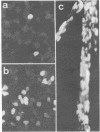Abstract
Monoclonal antibodies specifically reactive against prestalk and prespore cells of the cellular slime mold Dictyostelium discoideum were obtained. By the use of these antibodies, we examined processes of differentiation of the two cell types during development. Cells stained with prespore-specific antibodies first appeared after 12-14 hr of starvation within cell aggregates with tips, coincidentally with the appearance of other prespore markers. The number of prespore cells then increased to a level of 70-80% of total cells at the slug stage. By contrast, cells stained with prestalk-specific antibodies began to appear after 3 hr of starvation and thereafter increased in number to a maximum of ca. 80% after 12 hr of starvation. Stained cells appeared at random in the aggregation field and were not morphologically distinguishable from unstained cells. Furthermore, cells showed a considerable heterogeneity in the amount of antigen they contain. Concomitantly with the increase in prespore cells, the number of cells stained by the prestalk antibodies decreased to a level of ca. 20% by the slug stage. From these experiments, we suggest that the prestalk antigen is synthesized in the majority of cells during the early period of aggregation. Within tight cell aggregates, some of these cells lose the antigen to become prespore cells and the normal proportion between the two cell types will eventually result within slugs.
Keywords: pattern formation, cell contact, immunocytochemistry, slime mold, Dictyostelium discoideum
Full text
PDF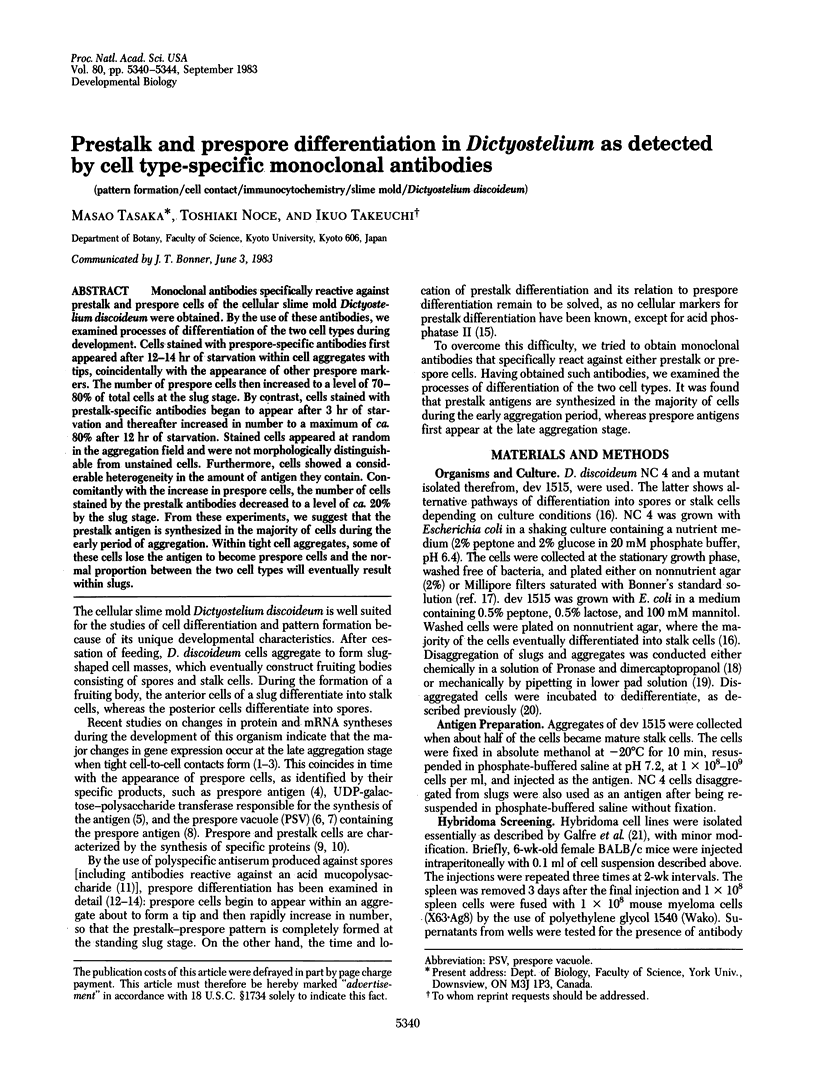
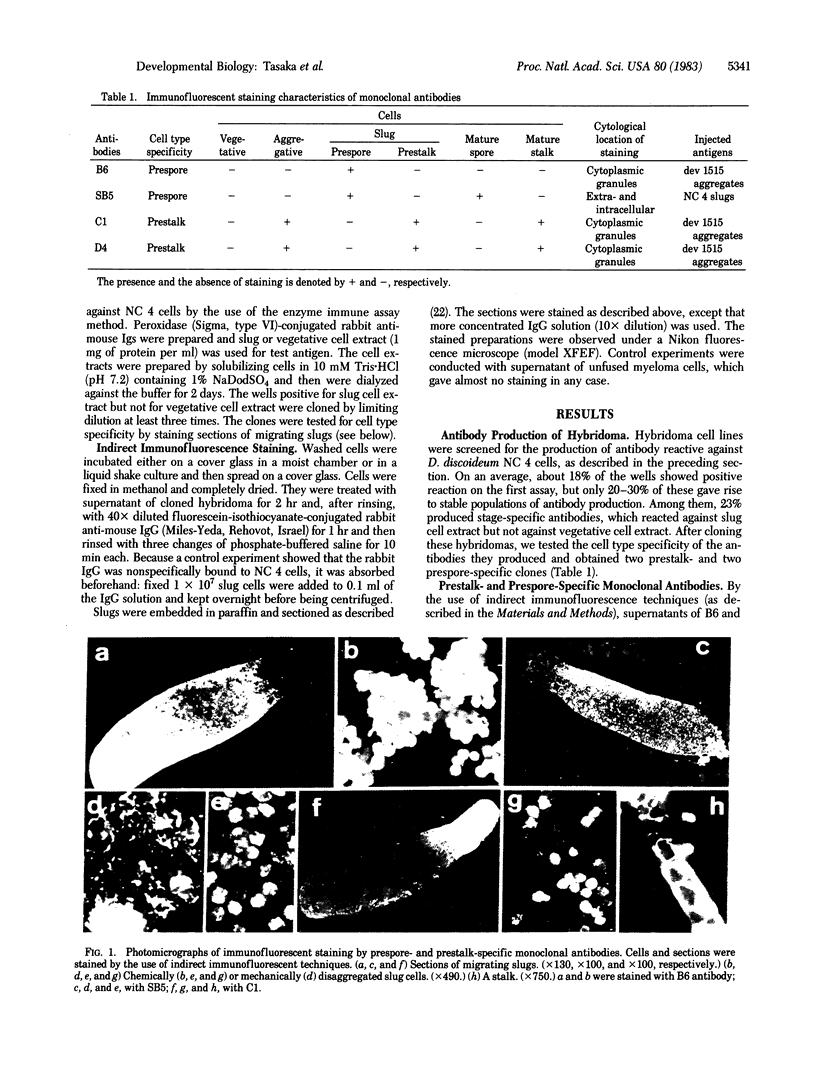
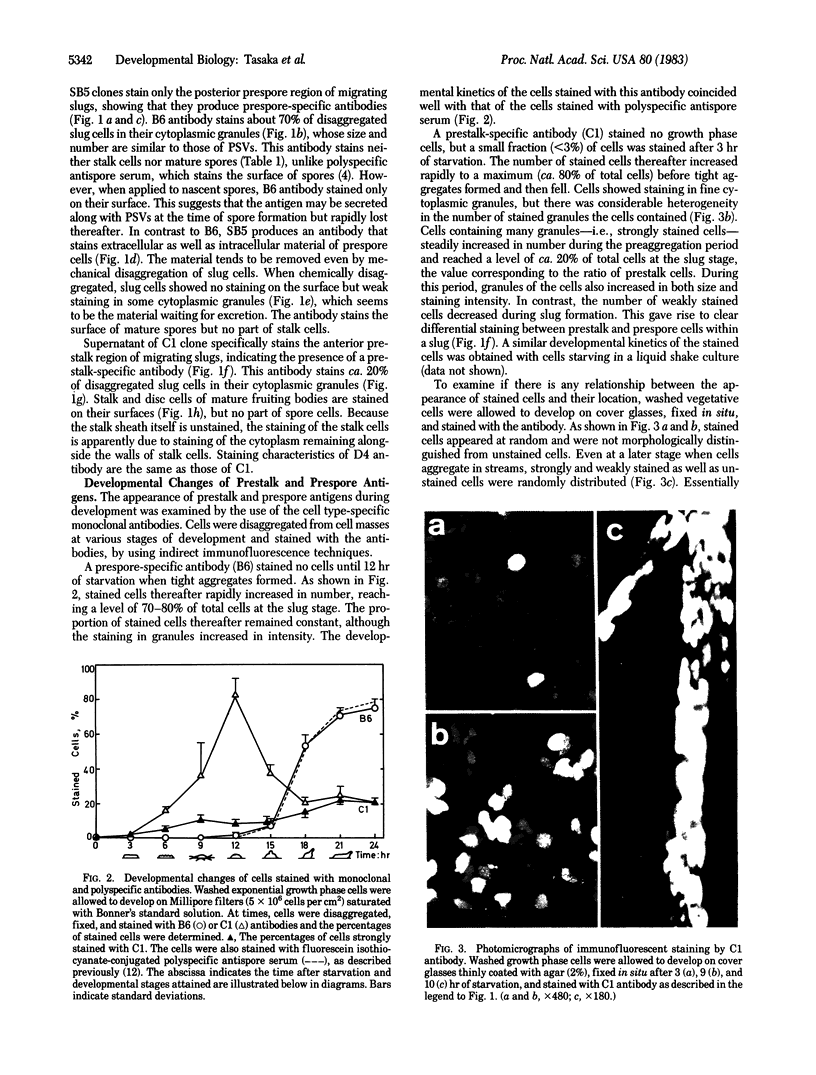
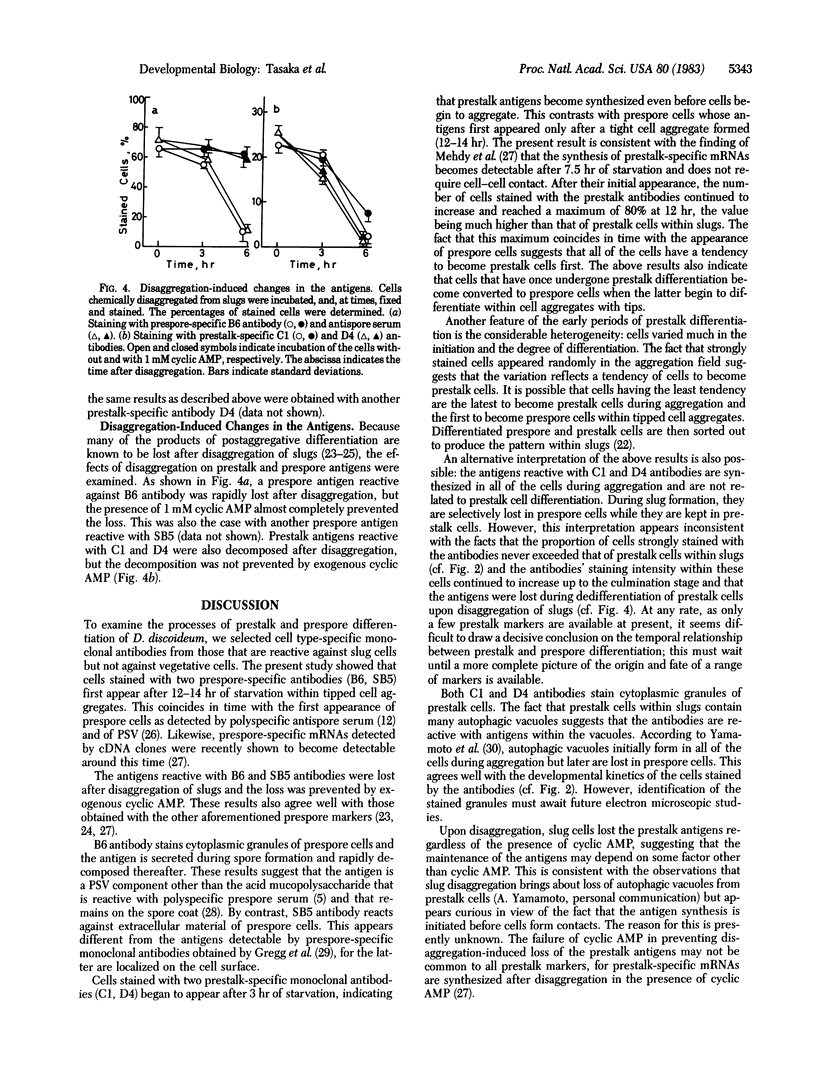
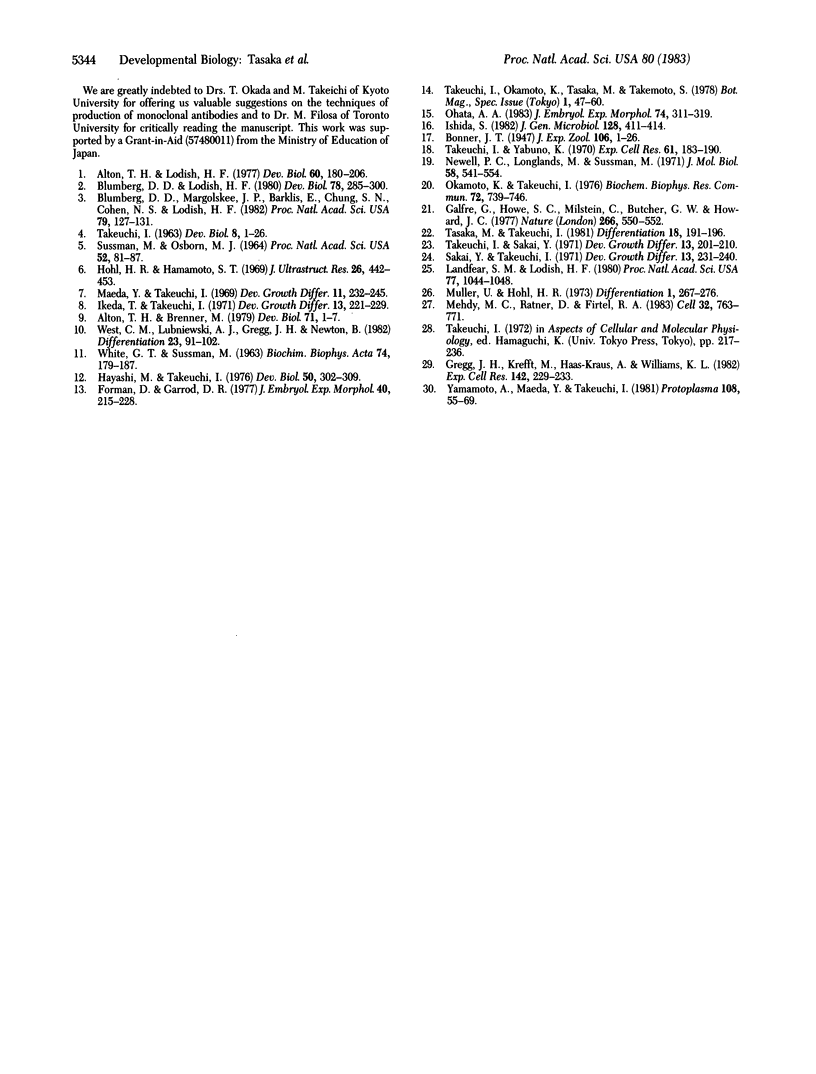
Images in this article
Selected References
These references are in PubMed. This may not be the complete list of references from this article.
- Alton T. H., Brenner M. Comparison of proteins synthesized by anterior and posterior regions of Dictyostelium discoideum pseudoplasmodia. Dev Biol. 1979 Jul;71(1):1–7. doi: 10.1016/0012-1606(79)90077-0. [DOI] [PubMed] [Google Scholar]
- Alton T. H., Lodish H. F. Developmental changes in messenger RNAs and protein synthesis in Dictyostelium discoideum. Dev Biol. 1977 Oct 1;60(1):180–206. doi: 10.1016/0012-1606(77)90118-x. [DOI] [PubMed] [Google Scholar]
- Blumberg D. D., Lodish H. F. Changes in the messenger RNA population during differentiation of dictyostelium discoideum. Dev Biol. 1980 Aug;78(2):285–300. doi: 10.1016/0012-1606(80)90337-1. [DOI] [PubMed] [Google Scholar]
- Blumberg D. D., Margolskee J. P., Barklis E., Chung S. N., Cohen N. S., Lodish H. F. Specific cell-cell contacts are essential for induction of gene expression during differentiation of Dictyostelium discoideum. Proc Natl Acad Sci U S A. 1982 Jan;79(1):127–131. doi: 10.1073/pnas.79.1.127. [DOI] [PMC free article] [PubMed] [Google Scholar]
- Forman D., Garrod D. R. Pattern formation in Dictysotelium discoideum. I. Development of prespore cells and its relationship to the pattern of the fruiting body. J Embryol Exp Morphol. 1977 Aug;40:215–228. [PubMed] [Google Scholar]
- Galfre G., Howe S. C., Milstein C., Butcher G. W., Howard J. C. Antibodies to major histocompatibility antigens produced by hybrid cell lines. Nature. 1977 Apr 7;266(5602):550–552. doi: 10.1038/266550a0. [DOI] [PubMed] [Google Scholar]
- Gregg J. H., Krefft M., Haas-Kraus A., Williams K. L. Antigenic differences detected between prespore cells of Dictyostelium discoideum and Dictyostelium mucoroides using monoclonal antibodies. Exp Cell Res. 1982 Nov;142(1):229–233. doi: 10.1016/0014-4827(82)90427-x. [DOI] [PubMed] [Google Scholar]
- Hayashi M., Takeuchi I. Quantitative studies on cell differentiation during morphogenesis of the cellular slime mold Dictyostelium discoideum. Dev Biol. 1976 Jun;50(2):302–309. doi: 10.1016/0012-1606(76)90153-6. [DOI] [PubMed] [Google Scholar]
- Hohl H. R., Hamamoto S. T. Ultrastructure of spore differentiation in Dictyostelium: the prespore vacuole. J Ultrastruct Res. 1969 Mar;26(5):442–453. doi: 10.1016/s0022-5320(69)90050-1. [DOI] [PubMed] [Google Scholar]
- Ikeda T., Takeuchi I. Isolation and characterization of a prespore specific structure of the cellular slime mold, Dictyostelium discoideum. Dev Growth Differ. 1971 Dec;13(4):221–229. doi: 10.1111/j.1440-169x.1971.00221.x. [DOI] [PubMed] [Google Scholar]
- Landfear S. M., Lodish H. F. A role for cyclic AMP in expression of developmentally regulated genes in Dictyostelium discoideum. Proc Natl Acad Sci U S A. 1980 Feb;77(2):1044–1048. doi: 10.1073/pnas.77.2.1044. [DOI] [PMC free article] [PubMed] [Google Scholar]
- Maeda Y., Takeuchi I. Cell differentiation and fine structures in the development of the cellular slime molds. Dev Growth Differ. 1969 Dec;11(3):232–245. doi: 10.1111/j.1440-169x.1969.00232.x. [DOI] [PubMed] [Google Scholar]
- Mehdy M. C., Ratner D., Firtel R. A. Induction and modulation of cell-type-specific gene expression in Dictyostelium. Cell. 1983 Mar;32(3):763–771. doi: 10.1016/0092-8674(83)90062-4. [DOI] [PubMed] [Google Scholar]
- Newell P. C., Longlands M., Sussman M. Control of enzyme synthesis by cellular interaction during development of the cellular slime mold Dictyostelium discoideum. J Mol Biol. 1971 Jun 14;58(2):541–554. doi: 10.1016/0022-2836(71)90370-6. [DOI] [PubMed] [Google Scholar]
- Okamoto K., Takeuchi I. Changes in activities of two developmentally regulated enzymes induced by disaggregation of the pseudoplasmodia of Dictyostelium discoideum. Biochem Biophys Res Commun. 1976 Sep 20;72(2):739–746. doi: 10.1016/s0006-291x(76)80101-5. [DOI] [PubMed] [Google Scholar]
- Oohata A. A. A prestalk-cell-specific acid phosphatase in Dictyostelium discoideum. J Embryol Exp Morphol. 1983 Apr;74:311–319. [PubMed] [Google Scholar]
- SUSSMAN M., OSBORN M. J. UDP-GALACTOSE POLYSACCHARIDE TRANSFERASE IN THE CELLULAR SLIME MOLD, DICTYOSTELIUM DISCOIDEUM: APPEARANCE AND DISAPPEARANCE OF ACTIVITY DURING CELL DIFFERENTIATION. Proc Natl Acad Sci U S A. 1964 Jul;52:81–87. doi: 10.1073/pnas.52.1.81. [DOI] [PMC free article] [PubMed] [Google Scholar]
- Sakai Y., Takeuchi I. Changes of the prespore specific structure during dedifferentiation and cell type conversion of a slime mold cell. Dev Growth Differ. 1971 Dec;13(4):231–240. doi: 10.1111/j.1440-169x.1971.00231.x. [DOI] [PubMed] [Google Scholar]
- TAKEUCHI I. IMMUNOCHEMICAL AND IMMUNOHISTOCHEMICAL STUDIES ON THE DEVELOPMENT OF THE CELLULAR SLIME MOLD DICTYOSTELIUM MUCOROIDES. Dev Biol. 1963 Aug;8:1–26. doi: 10.1016/0012-1606(63)90023-x. [DOI] [PubMed] [Google Scholar]
- Takeuchi I., Sakai Y. Dedifferentiation of the disaggregated slug cell of the cellular slime mold Dictyostelium discoideum. Dev Growth Differ. 1971 Dec;13(4):201–210. doi: 10.1111/j.1440-169x.1971.00201.x. [DOI] [PubMed] [Google Scholar]
- Takeuchi I., Yabuno K. Disaggregation of slime mold pseudoplasmodia using EDTA and various proteolytic enzymes. Exp Cell Res. 1970 Jul;61(1):183–190. doi: 10.1016/0014-4827(70)90272-7. [DOI] [PubMed] [Google Scholar]
- Tasaka M., Takeuchi I. Role of cell sorting in pattern formation in Dictyostelium discoideum. Differentiation. 1981;18(3):191–196. doi: 10.1111/j.1432-0436.1981.tb01122.x. [DOI] [PubMed] [Google Scholar]
- West C. M., Lubniewski A. J., Gregg J. H., Newton B. A temperature-dependent choice in cell differentiation. Differentiation. 1982;23(2):91–102. doi: 10.1111/j.1432-0436.1982.tb01271.x. [DOI] [PubMed] [Google Scholar]




